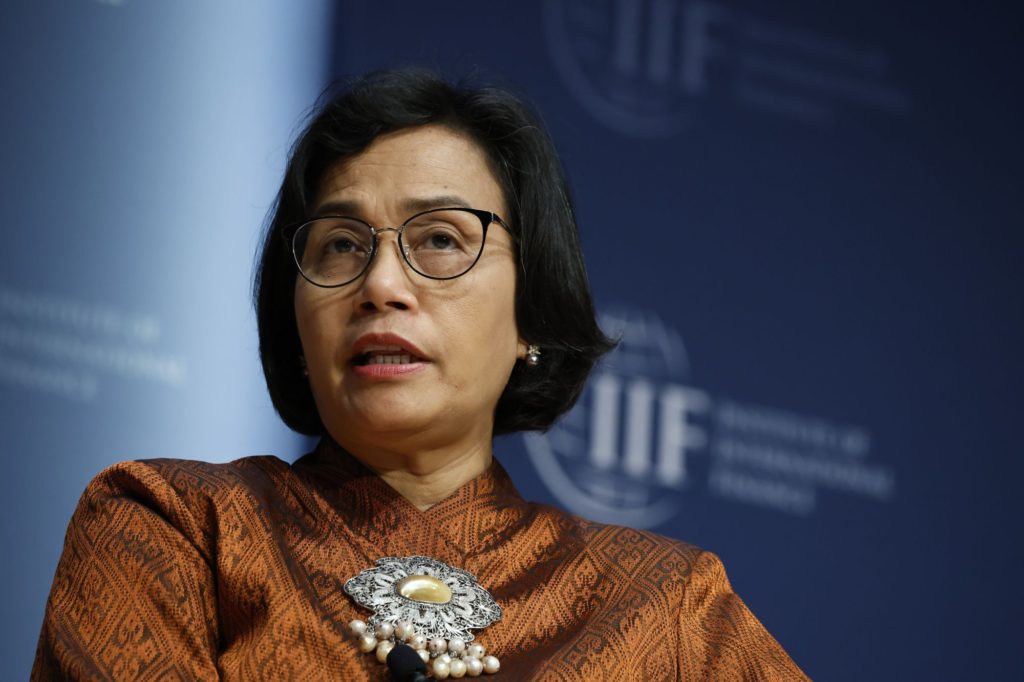Indonesia will make another attempt to enact far-reaching reform for its financial system that could include expanding the central bank’s mandate and paving the way for debt monetization during crises.
(Bloomberg) — Indonesia will make another attempt to enact far-reaching reform for its financial system that could include expanding the central bank’s mandate and paving the way for debt monetization during crises.
A parliamentary commission is expected to swiftly approve the latest draft of the financial sector omnibus bill in one or two sessions after reviewing the articles and concluding talks with stakeholders, Finance Minister Sri Mulyani Indrawati told Bloomberg Television’s Stephen Engle on Sunday.
Once that’s approved, the bill could be passed at the next plenary session.
The proposed legislation, first introduced in 2020, would amend dozens of “outdated” laws that govern the financial sector, including the capital market, banking, insurance and pension, Indrawati said in an interview in Bali on Sunday ahead of the Group of 20 Summit on Nov.
15-16.
More regulations are also needed for the digital financial sector as current policies are inadequate, she added.
More pertinent to investors, though, are provisions stated in earlier versions of the bill that seek to add supporting economic growth and job creation to Bank Indonesia’s mandate of maintaining price and currency stability.
The central bank could also be tasked to buy sovereign bonds directly in the primary market during times of crisis, as decided by a committee led by the finance minister.
President Joko Widodo has long sought to make permanent such unconventional coordination between the government and the monetary authority that has allowed Southeast Asia’s biggest economy to emerge well from the pandemic.
However, concern among investors that it could weaken the central bank’s autonomy has held up the legislative process until now.
The finance chief repeated assurances that Bank Indonesia’s independence would be maintained to keep monetary policy credible.
Authorities do not want to “destroy” the country’s “foundation of macroeconomic stability,” Indrawati said.
Cash Rich
Southeast Asia’s largest economy expects to end the year with a “much, much lower” budget deficit due to the strong growth in tax revenues.
With plenty of cash on hand, the government has space to wait out volatility in the first half of 2023 before jumping back into the bond market, Indrawati said.
“We will always be opportunistic with the timing.
It’s known to many investors that Indonesia is very prudent and healthy fiscally. Hopefully that will provide us with a competitive price,” she said, adding that the government could consider currencies like the euro and yen for a global bond, given the recent strength of the US dollar.
Indrawati also confirmed that the planned carbon tax will be delayed to 2025 to give the economy time to recover, and the industry to better understand the new levy.
Export taxes on nickel pig iron and ferronickel and subsidies on electric vehicle purchases are still being studied, she said.
G-20 Presidency
As the year’s culminating G-20 summit kicks off on Tuesday, Indrawati said Indonesia’s presidency of the group would be able to deliver concrete results, even if it skips a joint communique yet again.
A $1.4 billion pandemic fund was launched on Sunday, and a separate climate finance pact of up to $20 billion could be announced this week too.
Another event to watch will be the landmark meeting between US President Joe Biden and Chinese President Xi Jinping in Bali, which takes place against the backdrop of a slowing global economy and worsening geopolitical tensions after Russia’s invasion of Ukraine.
“Our responsibility as G-20 president is to try to continue bridging the gap,” Indrawati said.
“Many global situations now cannot be solved by any single country, like the pandemic, climate change, geopolitics, or even digital technology. This will all force us to work together.”
More stories like this are available on bloomberg.com
©2022 Bloomberg L.P.











